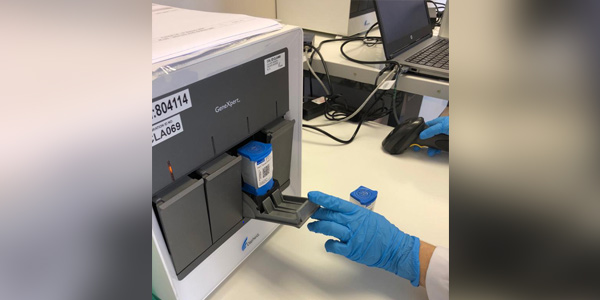GeneXpert testing platform for TB repurposed to accelerate testing for Covid-19
- Wits University
Efforts to test for Covid-19 in SA have been boosted through repurposing the Cepheid GeneXpert® Systems, originally designed to test for tuberculosis (TB).
The first batch of GeneXpert machines began testing for Covid-19 ahead of Freedom Day on 26 April 2020.

The combined efforts of joint staff in the Division of Haematology and Molecular Medicine at Wits University and the National Health Laboratory Service (NHLS), along with the National Department of Health (NDoH) has enabled the National Priority Programme (NPP) division to now also support Covid-19 testing in record time.
The NPP division enables the NDoH to provide increased access to patient testing and treatment – now also for Covid-19. Professor Wendy Stevens, Head of Haematology and Molecular Medicine in the School of Pathology at Wits leads the NPP division, which aims to provide affordable, accessible HIV and TB diagnostic services that yield accurate, reliable, relevant and timely results.
These services and results align with NDoH strategy and are based on current scientific knowledge and international norms. Through efficiently leveraging existing resources, including the GeneXpert platform, the NPP division can now also respond to the global Covid-19 pandemic.
There is no doubt that the GeneXpert System will make a massive difference in testing capacity, provided that there is constant access to reagents and the appropriate human resources support. The GeneXpert System is simple to run, with the bigger machines accepting up to 80 cartridges at a time.
It is forecasted that if all the Covid-19 testing sites are operational on a 24-hour basis, up to 15 000 additional tests can be conducted daily from these machines alone. The data collected from the testing sites will provide valuable insight into the spread of the virus and hopefully contribute to a greater understanding of it in the South African context.
Xpert diagnostics for Covid-19
The GeneXpert platform has been used extensively in South Africa to test for TB for almost a decade. The initial rollout took 18 months to complete. Now, with the Covid-19 pandemic, the NHLS has utilized its existing TB footprint and condensed the escalation of testing into just one month.
The NHLS has been responsible for the implementation and programmatic monitoring of TB through GeneXpert since 2011. Developed by American-based company Cepheid, these systems are distributed to 166 laboratories in South Africa, with more than 325 machines ranging in size and capacity, the smallest no bigger than a desktop computer. More than 17 million TB tests have been conducted to date – 1.7 million positive cases and more than 100 000 drug-resistant cases have been detected.
Thanks to the GeneXpert’s ability to test an array of assays (including HIV), GeneXpert instruments are now being used to test for the presence of Covid-19. Cepheid released their Xpert® Xpress SARS-CoV-2 cartridge on 21 March 2020, following emergency Federal Drug Administration approval, to support the scale-up of testing. Training material has been distributed to all users.
To detect Covid-19, the machines are loaded with the test cartridges containing a combination of a patient’s specimen (e.g., pharyngeal swab) and chemical reagents, thereby enabling detection of certain genetic material. Once a cartridge is loaded, it produces a result within 45 minutes.
Xpert project management

With experience gained in managing the GeneXpert Programme for TB testing since its inception, Ms Puleng Marokane, the GeneXpert Project Manager within the NPP division of the NHLS, has been tasked with ensuring the smooth rollout of Covid-19 testing nationwide.
Marokane explained that successful implementation of the system was only possible if all the parameters were in place. The system would have to be loaded with Covid-19-specific software, and cartridges validated to ensure they could produce the requisite results. Although laboratory technicians have used GeneXpert Systems before, it was important that they adapted to the new Covid-19 interface.
Online training in this regard focused mainly on the new cartridge, processing and result interpretation, whilst emphasising Good Clinical Laboratory Practice. This was guided by a standard operating procedure (SOP) developed by the NPP and used across all test sites.
“This was not an easy job [in lockdown]. We had to rely on everybody’s experience with GeneXpert to ensure they could load the software themselves. Our task then was to try to cover all nine provinces. We were hoping to implement testing in a phased manner, but because this is an emergency, it is not always possible,” said Marokane.
Once technicians had familiarized themselves with the system, they were able to begin the cartridge verification process. A limited number of reagents were ordered centrally and were sent through to specific sites. Verification panels were developed by SmartSpot®, a manufacturing company co-founded by Professor Stevens and Professor Lesley Scott in the School of Pathology at Wits, to aid with diagnostic testing.
Covid-19 sample verification was kept to a minimum due to a shortage of reagents – all that was required was to confirm the system could produce a positive or negative result. To date, eight of the testing sites have passed the verification process and have gone live for testing.
Testing and training in challenging times
Marokane and her team have worked tirelessly to ensure operational stability of the system. However, a project of this scope is not without challenges. South Africa’s national lockdown impedes the shipment of reagents, the vital component required to meet the kind of daily testing numbers the health ministry is hoping to achieve. At the time of writing, an additional 10 000 reagents were received from Cepheid. But with South African borders being closed indefinitely, access remains an issue.
Some staff members have expressed concern about their personal safety during the testing process. The NPP, through the NHLS, is working closely with safety departments: virtual training is being rolled out for NHLS staff; SOP material has been made available to advise laboratories on processing the test method, as well as sample disposal; and the appropriate Personal Protective Equipment (PPE) has been provided in line with government regulations.
“All that is left to do at this stage is to monitor the implementation processes. We want to ensure users are comfortable using the tests,” added Marokane.

